Towards the end of her freshman year in Mahanoy Area High School, a student referred to as B.L. was notified of the fact that she had not made the school’s varsity cheerleading team, and would remain in the junior varsity cheerleading team for the time being.
While shopping with her friend, frustration overcame B.L, enough so that she proceeded to record a Snapchat story expressing her pent-up feelings to over 250 viewers.
“F— school. F—softball. F— cheer. F— everything,” the text spelled, alongside a photo B.L. posted in which she is seen with her friend sticking out their tongues, as well as displaying their middle fingers.
One of these viewers was a classmate who screenshotted her story and later showed it to her mother, who happened to be the coach of the cheerleading team. The Mahanoy School District was displeased with B.L., because her actions demonstrated a lack of respect in regards to the school, and potentially tarnished the school’s reputation. As a result, B.L. was suspended from participating in the school’s junior varsity cheerleading team for a full consecutive year.
The district insisted on implementing this punishment and stated that she defied the school’s preexisting rules. However, B.L. argued that her behavior occurred outside of the school campus; in the year 2017, the United States Court of Appeals for the Third Circuit ruled that the school district violated the student’s rights, which are legally provided to her by the First Amendment.
Unfortunately, this ruling could significantly limit how schools handle distressing happenings, such as racism and cyberbullying, that occur beyond school grounds. Earlier this year, the United States Supreme Court accepted this case for consideration, on account of various school districts’ urges to revisit and reevaluate the topic.
As B.L. and her lawyers anticipate the United States Supreme Court’s deliberation, the question has arisen as to whether or not the school retained the right to suspend B.L. from the junior varsity cheerleading team based on her actions.
“They should hold students accountable for what they say off-campus because it can potentially have a greater impact than it may seem,” sophomore William Otero said.
Through an online poll, students attending Van Nuys High School contributed their thoughts regarding this ongoing dispute. 16% of students polled voted that schools should be allowed to hold students accountable for what they say outside of school, while 84% of students polled voted that schools should not be permitted such authority.
Others deduce that such decisions should be individually based on the specific details and relative gravity of the instances.
“I think it generally depends on how bad the situation is,” sophomore Amalia Chamichyan said when asked about the topic.
Countless school districts hope the United States Supreme Court will accept B.L.’s case and are optimistic that the subject of freedom of speech, in regards to schools, will be reasonably settled, as well as clearly defined and implemented.
“I believe that students should be held accountable for the things they say,” graphic design teacher Ms. Miya Kuromiya said. “As a teacher, I apply the same standard to myself. Just like my behavior reflects upon my immediate family, I would hope students feel they are a member of our school family. Whilst we have done our job to graduate intelligent students, any statements made should be the result of critical thinking, making a fair assessment, taking civil responsibility, and speaking truthfully.”



